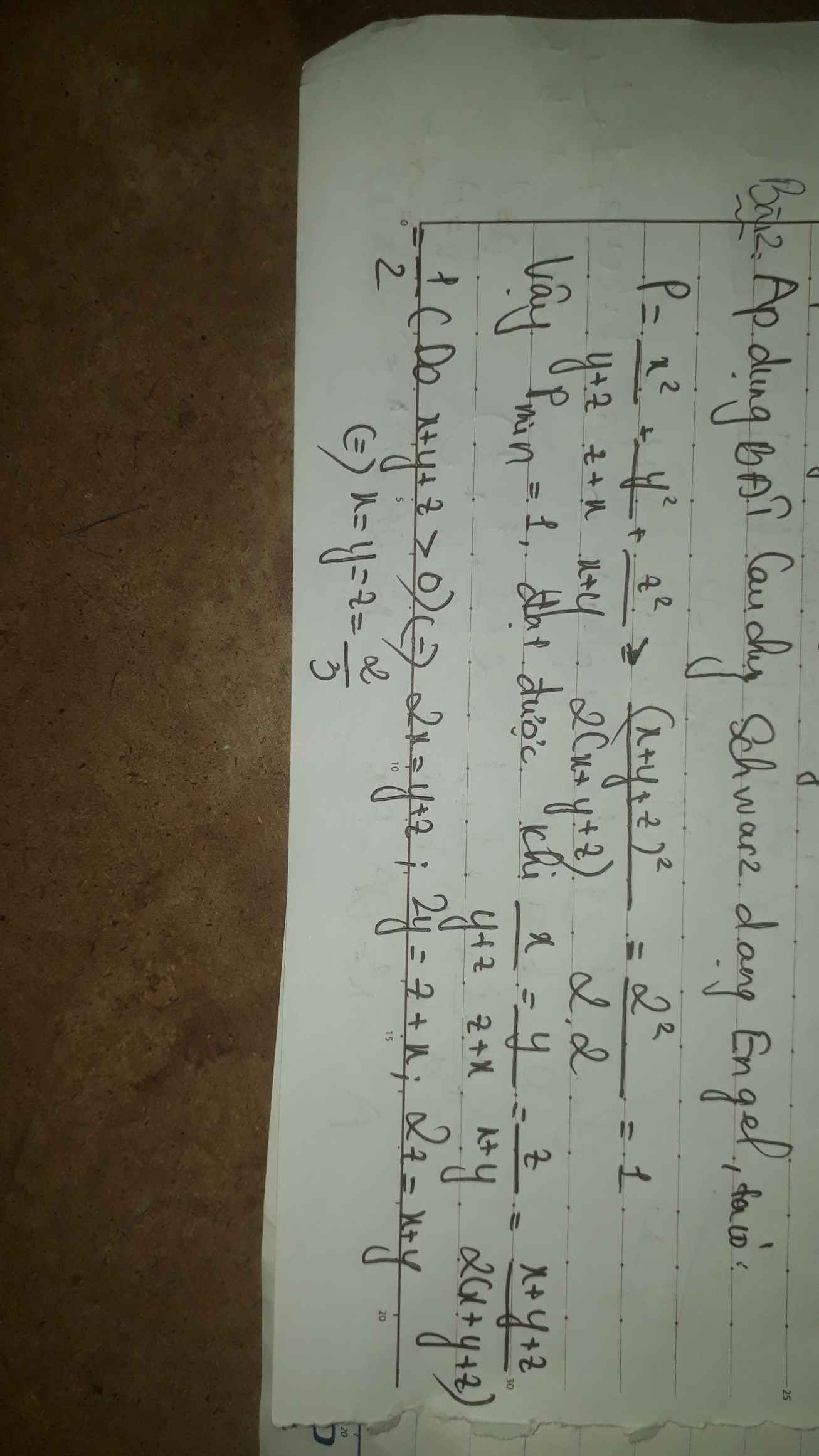cho x > 1. tìm gtnn của A = x/2 + 2/x-4
Hãy nhập câu hỏi của bạn vào đây, nếu là tài khoản VIP, bạn sẽ được ưu tiên trả lời.


1.
$x(x+2)(x+4)(x+6)+8$
$=x(x+6)(x+2)(x+4)+8=(x^2+6x)(x^2+6x+8)+8$
$=a(a+8)+8$ (đặt $x^2+6x=a$)
$=a^2+8a+8=(a+4)^2-8=(x^2+6x+4)^2-8\geq -8$
Vậy $A_{\min}=-8$ khi $x^2+6x+4=0\Leftrightarrow x=-3\pm \sqrt{5}$
2.
$B=5+(1-x)(x+2)(x+3)(x+6)=5-(x-1)(x+6)(x+2)(x+3)$
$=5-(x^2+5x-6)(x^2+5x+6)$
$=5-[(x^2+5x)^2-6^2]$
$=41-(x^2+5x)^2\leq 41$
Vậy $B_{\max}=41$. Giá trị này đạt tại $x^2+5x=0\Leftrightarrow x=0$ hoặc $x=-5$

1. x≥1 <=> \(\frac{1}{x}\le1\Leftrightarrow\frac{1}{x}+1\le2\Leftrightarrow A\le2\Rightarrow MaxA=2\Leftrightarrow x=1\)
2. Áp dụng bđt cosi cho x>0. ta có: \(x+\frac{1}{x}\ge2\sqrt{x.\frac{1}{x}}=2\Leftrightarrow P\ge2\Rightarrow MinP=2\Leftrightarrow x=\frac{1}{x}\Leftrightarrow x=1\)
3: \(A=\frac{x^2+x+4}{x+1}=\frac{\left(x^2+2x+1\right)-\left(x+1\right)+4}{x+1}=x+1-1+\frac{4}{x+1}\)
áp dụng cosi cho 2 số dương ta có: \(x+1+\frac{4}{x+1}\ge2\sqrt{x+1.\frac{4}{x+1}}=2\Leftrightarrow A+1\ge2\Rightarrow A\ge3\Rightarrow MinA=3\Leftrightarrow x+1=\frac{4}{x+1}\Leftrightarrow x=1\)

Cau 1: Ta có:
A=x^2 - 2*3x + 9 +2(y^2 - 2y +1) + 7
=(x-3)^2 +2(y-1)^2 +7 >+ 7
=> minA= 7 <=> x=3 và y=1

bài này dễ ẹt ak
nhưng giúp mình bài này đi
chotam giac abc . co canh bc=12cm, duong cao ah=8cm
a> tinh s tam giac abc
b> tren canh bc lay diem e sao cho be=3/4bc. tinh s tam giac abe va s tam giac ace ( bằng nhiều cách )
c> lay diem chinh giua cua canh ac va m . tinh s tam giac ame

1) Áp dụng bđt Cauchy cho 3 số dương ta có
\(\dfrac{1}{x}+\dfrac{1}{x}+\dfrac{1}{x}+x^3\ge4\sqrt[4]{\dfrac{1}{x}.\dfrac{1}{x}.\dfrac{1}{x}.x^3}=4\) (1)
\(\dfrac{3}{y^2}+y^2\ge2\sqrt{\dfrac{3}{y^2}.y^2}=2\sqrt{3}\) (2)
\(\dfrac{3}{z^3}+z=\dfrac{3}{z^3}+\dfrac{z}{3}+\dfrac{z}{3}+\dfrac{z}{3}\ge4\sqrt[4]{\dfrac{3}{z^3}.\dfrac{z}{3}.\dfrac{z}{3}.\dfrac{z}{3}}=4\sqrt{3}\) (3)
Cộng (1);(2);(3) theo vế ta được
\(\left(\dfrac{3}{x}+\dfrac{3}{y^2}+\dfrac{3}{z^3}\right)+\left(x^3+y^2+z\right)\ge4+2\sqrt{3}+4\sqrt{3}\)
\(\Leftrightarrow3\left(\dfrac{1}{x}+\dfrac{1}{y^2}+\dfrac{1}{z^3}\right)\ge3+4\sqrt{3}\)
\(\Leftrightarrow P\ge\dfrac{3+4\sqrt{3}}{3}\)
Dấu "=" xảy ra <=> \(\left\{{}\begin{matrix}\dfrac{1}{x}=x^3\\\dfrac{3}{y^2}=y^2\\\dfrac{3}{z^3}=\dfrac{z}{3}\end{matrix}\right.\Leftrightarrow\left\{{}\begin{matrix}x=1\\y=\sqrt[4]{3}\\z=\sqrt{3}\end{matrix}\right.\) (thỏa mãn giả thiết ban đầu)
2) Ta có \(4\sqrt{ab}=2.\sqrt{a}.2\sqrt{b}\le a+4b\)
Dấu"=" khi a = 4b
nên \(\dfrac{8}{7a+4b+4\sqrt{ab}}\ge\dfrac{8}{7a+4b+a+4b}=\dfrac{1}{a+b}\)
Khi đó \(P\ge\dfrac{1}{a+b}-\dfrac{1}{\sqrt{a+b}}+\sqrt{a+b}\)
Đặt \(\sqrt{a+b}=t>0\) ta được
\(P\ge\dfrac{1}{t^2}-\dfrac{1}{t}+t=\left(\dfrac{1}{t^2}-\dfrac{2}{t}+1\right)+\dfrac{1}{t}+t-1\)
\(=\left(\dfrac{1}{t}-1\right)^2+\dfrac{1}{t}+t-1\)
Có \(\dfrac{1}{t}+t\ge2\sqrt{\dfrac{1}{t}.t}=2\) (BĐT Cauchy cho 2 số dương)
nên \(P=\left(\dfrac{1}{t}-1\right)^2+\dfrac{1}{t}+t-1\ge\left(\dfrac{1}{t}-1\right)^2+1\ge1\)
Dấu "=" xảy ra <=> \(\left\{{}\begin{matrix}\dfrac{1}{t}-1=0\\t=\dfrac{1}{t}\end{matrix}\right.\Leftrightarrow t=1\)(tm)
khi đó a + b = 1
mà a = 4b nên \(a=\dfrac{4}{5};b=\dfrac{1}{5}\)
Vậy MinP = 1 khi \(a=\dfrac{4}{5};b=\dfrac{1}{5}\)

a: Sửa đề: 4/x^2-1
a: \(A=\left(\dfrac{x+1}{x-1}+\dfrac{4}{x^2-1}-\dfrac{x-1}{x+1}\right):\dfrac{x^2-4x+4}{x^2+x}\)
\(=\dfrac{x^2+2x+1+4-x^2+2x-1}{\left(x-1\right)\left(x+1\right)}\cdot\dfrac{x\left(x+1\right)}{\left(x-2\right)^2}\)
\(=\dfrac{4x+4}{\left(x-1\right)}\cdot\dfrac{x}{\left(x-2\right)^2}=\dfrac{x\left(4x+4\right)}{\left(x-1\right)\left(x-2\right)^2}\)
b: Khi x=1/2 thì \(A=\dfrac{\dfrac{1}{2}\left(2+4\right)}{\left(\dfrac{1}{2}-1\right)\left(\dfrac{1}{2}-2\right)^2}=\dfrac{-8}{3}\)

Áp dụng BĐT cô-si cho 2 số dương ta có :
\(\frac{x}{2}+\frac{2}{x}\ge2\sqrt{\frac{x}{2}.\frac{2}{x}}=2\Rightarrow A\ge2-4=-2\)
Dấu ''='' xảy ra khi và chỉ khi x = 2
Vậy GTNN của A = -2 khi x = 2